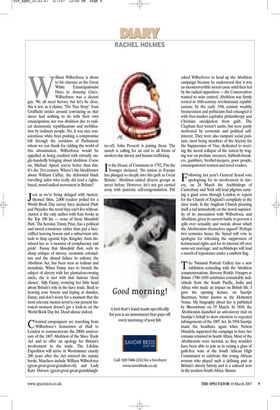W illiam Wilberforce is about to hit cinemas as the Great
White Emancipationist Hero in Amazing Grace. Wilberforce was a decent guy. We all need heroes; but let’s be clear, this is not, as it claims, ‘The True Story’. Ioan Gruffudd strides around convincing us that slaves had nothing to do with their own emancipation; nor was abolition due to radical democratic republicanism and mobilisation by ordinary people. No, it was nice conscientious white boys pushing a compromise bill through the corridors of Parliament whom we can thank for ridding the world of this abomination. Wilberforce would be appalled at being credited with virtually single-handedly bringing about abolition. Come on, Michael Apted, you’re better than this. It’s the 21st century. Where’s the blockbuster about William Cuffey, the deformed black travelling tailor who really did lead a rightsbased, moral radical movement in Britain?
Just as we’re being deluged with Austenthemed films, 2,000 readers polled for a World Book Day survey have declared Pride and Prejudice the novel they can’t live without. Austen is the only author with four books in the Top 100 list — none of them Mansfield Park. The heroine, Fanny Price, has a political and moral conscience rather than just a laceruffled heaving bosom and a subservient attitude to limp egoistic fops. Kingsley Amis dismissed her as ‘a monster of complacency and pride’. Funny that Mansfield Park, with its sharp critique of slavery, economic colonialism and the dismal failure to enforce the Abolition Act, has been seen as tedious and moralistic. When Fanny tries to broach the subject of slavery with her plantation-owning uncle, she is met with that famous ‘dead silence’. Silly Fanny, worrying her little head about Britain’s role in the slave trade. Back to heaving your bosom and lisping at dandies, Fanny, and don’t worry for a moment that the most relevant Austen novel to our present historical moment doesn’t get a look-in on the World Book Day list. Dead silence indeed.
Chained campaigners are marching from Wilberforce’s hometown of Hull to London to commemorate the 200th anniversary of the 1807 Abolition of the Slave Trade Act and to offer an apology for Britain’s involvement in the trade. The Lifeline Expedition will arrive in Westminster exactly 200 years after the Act entered the statute books. Marchers include William Wilberforce (great-great-great-grandson-of), and Lady Kate Davson (great-great-great-granddaugh ter-of). John Prescott is joining them. The march is calling for an end to all forms of modern-day slavery and human trafficking.
In the House of Commons in 1792, Pitt the Younger declared, ‘No nation in Europe has plunged so deeply into this guilt as Great Britain.’ Abolition united diverse groups as never before. However, let’s not get carried away with patriotic self-congratulation. Pitt asked Wilberforce to head up the Abolition campaign because he understood that it was an incontrovertible moral cause until then led by the radical opposition — the Conservatives wanted to seize control. Abolition was firmly rooted in 18th-century revolutionary republicanism; by the early 19th century wealthy businessmen and politicians had entangled it with free-market capitalist philanthropy and Christian exculpation from guilt. The Clapham Sect weren’t saints, but were partly motivated by economic and political selfinterest. They were also rampant social puritans, most being members of the Society for the Suppression of Vice, dedicated to averting the moral collapse of the nation by waging war on profane swearers, Sabbath-breakers, gamblers, brothel-keepers, poor people, emancipationist women and novel readers.
Following last year’s General Synod vote apologising for its involvement in slavery, on 24 March the Archbishops of Canterbury and York will lead pilgrims carrying a giant cross through London to repent for the Church of England’s complicity in the slave trade. Is the Anglican Church preening itself a tad immodestly on the moral superiority of its association with Wilberforce and Abolition, given its current battle to prevent a split over sexuality and morals about which the Abolitionists themselves argued? Perhaps two centuries hence the Synod will vote to apologise for tolerating the suppression of homosexual rights and for its internal rift over same-sex marriage; and archbishops will lead a march of repentance under a rainbow flag.
The National Portrait Gallery has a new exhibition coinciding with the Abolition commemorations. Between Worlds: Voyagers to Britain 1700–1850 celebrates remarkable individuals from the South Pacific, India and Africa who made an impact on British life. I gave the opening lecture, on Saartjie Baartman, better known as the Hottentot Venus. My biography about her is published by Bloomsbury on 19 March. In 1810, the Abolitionists launched an anti-slavery trial on Saartjie’s behalf to draw attention to repeated infringements of the 1807 Act. In 1994 Saartjie made the headlines again when Nelson Mandela supported the campaign to have her remains returned to South Africa. Most of the Abolitionists were teetotal, so they wouldn’t have been able to join us in raising a glass of guilt-free wine at the South African High Commission to celebrate this young African woman who played such a defining part in Britain’s slavery history and is a cultural icon in the modern South Africa. Shame.


























































































 Previous page
Previous page